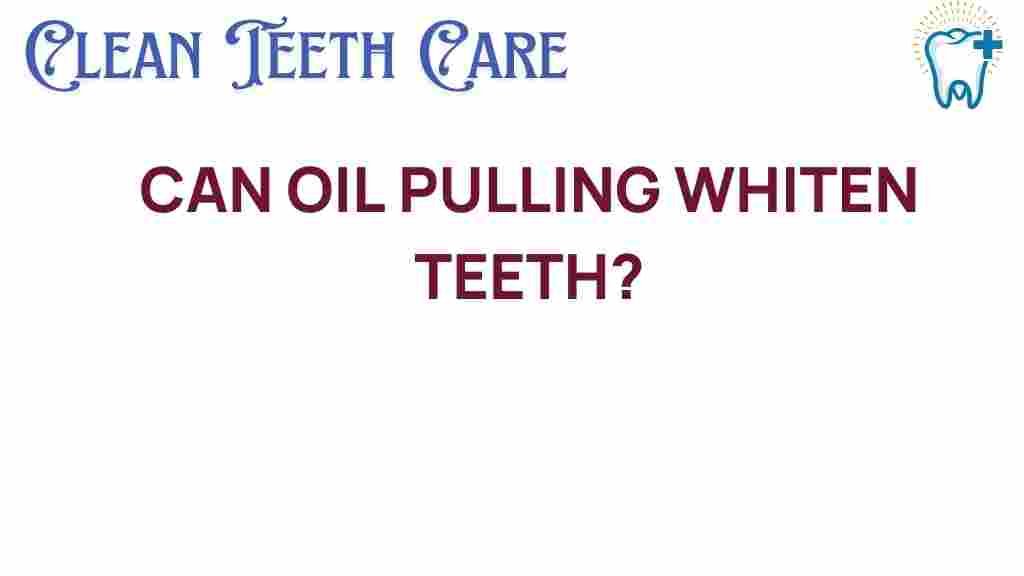The Secrets Behind Oil Pulling: Can It Really Whiten Your Teeth?
Oil pulling is an ancient practice that has gained popularity in recent years as a natural remedy for enhancing oral health and achieving whiter teeth. This holistic treatment involves swishing oil in your mouth to remove toxins and bacteria, promoting better dental hygiene. Many proponents claim that oil pulling can serve as an effective mouthwash alternative, particularly when using coconut oil. But does it truly work for teeth whitening? In this article, we’ll explore the secrets behind oil pulling, its benefits for oral health, and how it can help with enamel care.
What is Oil Pulling?
Oil pulling originated in Ayurvedic medicine thousands of years ago. The process involves taking a tablespoon of oil—commonly coconut oil—and swishing it around in the mouth for 15-20 minutes. This practice is said to help remove harmful bacteria and promote overall oral health.
Why Choose Coconut Oil?
Coconut oil is the most popular choice for oil pulling due to its numerous health benefits, including:
- Antimicrobial Properties: Coconut oil contains lauric acid, which has been shown to kill harmful bacteria in the mouth.
- Natural Flavor: Its pleasant taste makes the experience more enjoyable compared to other oils.
- Moisturizing Effect: Coconut oil can help combat dry mouth, which is beneficial for overall oral health.
How Does Oil Pulling Work for Teeth Whitening?
The primary mechanism behind oil pulling’s effectiveness lies in its ability to bind to bacteria and toxins in the mouth. When you swish the oil, it coats the teeth and gums, helping to lift away plaque and stains, which can lead to whiter teeth over time. Here’s how it may contribute to teeth whitening:
- Removing Stains: Oil pulling can help lift surface stains caused by food and drinks like coffee and tea.
- Reducing Plaque: By decreasing the accumulation of plaque, your teeth may appear whiter and healthier.
- Improving Gum Health: Healthier gums can contribute to a more aesthetically pleasing smile.
Step-by-Step Guide to Oil Pulling
If you’re interested in trying oil pulling for teeth whitening and oral health, follow these simple steps:
- Choose Your Oil: Use organic coconut oil or another oil of your choice, such as sesame or sunflower oil.
- Measure the Oil: Take about one tablespoon of the oil.
- Swish the Oil: Swish the oil around your mouth for 15-20 minutes. Make sure to push and pull the oil through your teeth.
- Do Not Swallow: Avoid swallowing the oil, as it contains toxins and bacteria.
- Spit It Out: After the time is up, spit the oil into a trash can (not the sink, as it can clog pipes).
- Rinse Your Mouth: Rinse your mouth with water to remove any remaining oil residue.
- Brush Your Teeth: Follow up with your regular toothpaste to ensure cleanliness.
Incorporating Oil Pulling into Your Routine
For best results, incorporate oil pulling into your daily dental hygiene routine. Many people find it beneficial to do this in the morning, before eating or drinking anything. Regular practice can enhance its effectiveness for teeth whitening and oral health.
Potential Benefits of Oil Pulling
Beyond whitening teeth, oil pulling offers several other benefits for oral health:
- Fresher Breath: By reducing bacteria in the mouth, oil pulling can help combat bad breath.
- Gum Health: Improved gum health can prevent issues such as gingivitis.
- Overall Detoxification: Oil pulling is believed to assist in detoxifying the body, although more research is needed to substantiate this claim.
Troubleshooting Tips for Oil Pulling
While oil pulling is generally safe, some individuals may experience discomfort or ineffectiveness. Here are some troubleshooting tips:
- Start Slowly: If you’re new to oil pulling, begin with 5-10 minutes and gradually increase the time.
- Choose the Right Oil: Experiment with different oils to find one you like best. If coconut oil is too solid, warm it slightly to liquefy.
- Stay Hydrated: Drink water before and after oil pulling to help maintain hydration and oral health.
- Consult Your Dentist: If you have dental issues or concerns, consult your dentist before starting oil pulling.
Common Misconceptions About Oil Pulling
There are several myths surrounding oil pulling that may deter some individuals from trying this natural remedy. Here are some common misconceptions:
- It Replaces Brushing: Oil pulling should not replace regular brushing and flossing; it is a supplementary practice.
- Instant Results: Teeth whitening through oil pulling takes time. Patience and consistency are key.
- Only for Adults: Oil pulling can be safe for children over a certain age, but supervision is recommended.
The Science Behind Oil Pulling
While many anecdotal reports support the benefits of oil pulling, scientific research is still ongoing. Some studies suggest that oil pulling can reduce oral bacteria and plaque, which can indirectly contribute to whiter teeth. However, more rigorous clinical trials are needed to establish concrete evidence of its efficacy in teeth whitening.
For a deeper understanding of the scientific aspects, consider reading studies on oil pulling and its effects on oral health. You can find more information here.
Conclusion: Is Oil Pulling Worth Trying?
Oil pulling is a simple and cost-effective holistic treatment that may enhance your oral health and contribute to teeth whitening. While it may not work for everyone, many individuals have reported positive results when incorporated into their dental hygiene routine. If you’re looking for a natural remedy to complement your oral care, oil pulling with coconut oil could be a beneficial practice.
Remember, achieving the best results takes time, and oil pulling should be used alongside regular dental practices, including brushing and flossing. If you’re curious about alternative methods for maintaining oral health and achieving a brighter smile, consider integrating oil pulling into your daily routine.
For more tips on natural remedies for oral health, check out this resource.
This article is in the category Treatments and created by CleanTeethCare Team
